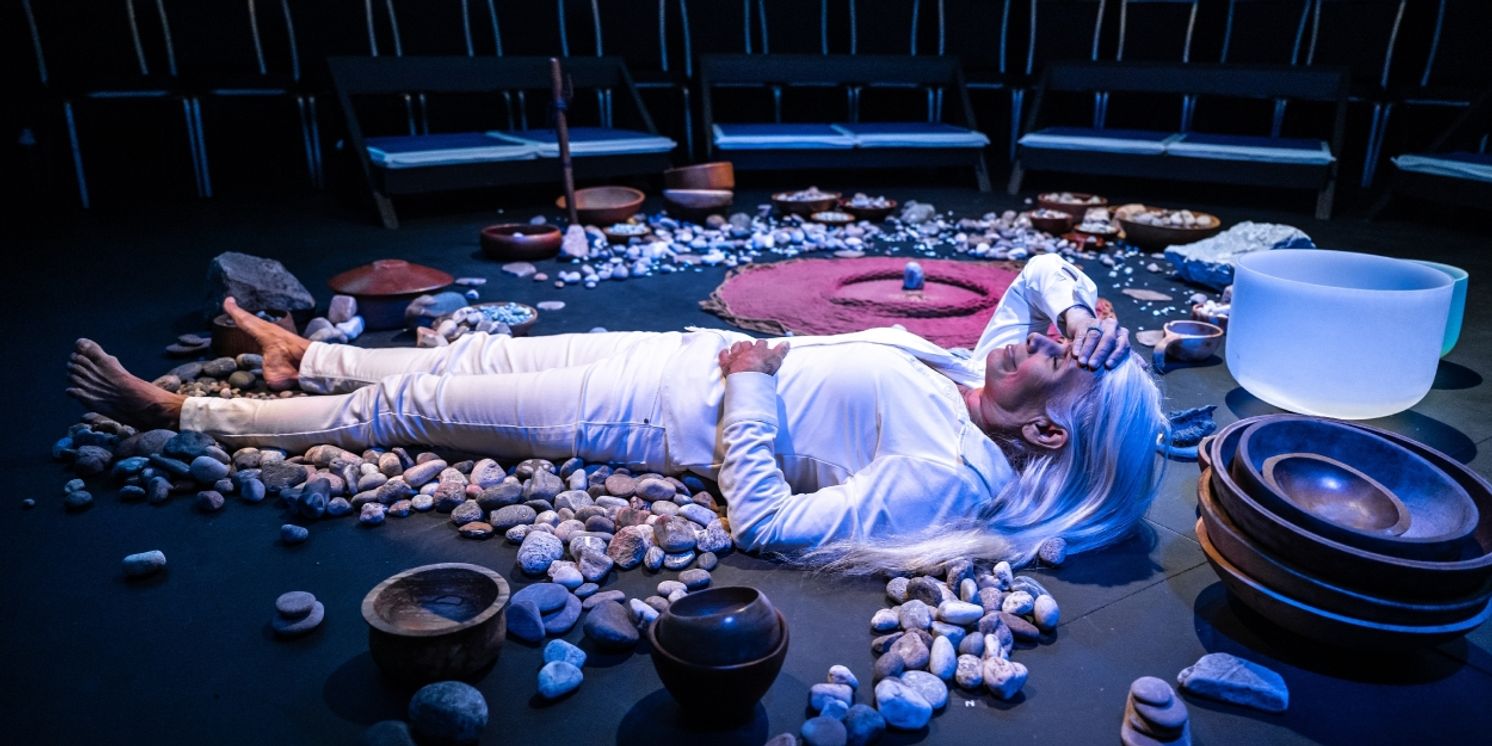Review: PROPHECY FOG at Coal Mine Theatre
Jani Lauzon's solo show invites us to contemplate stones, sky, and spirit

Modern theatre audiences tend not to do well with stillness, with waiting. Even 30 seconds of pausing on stage can seem like a small eternity. Unlike stones in a brook, we’re not content to rest and listen, letting what is flow around us. Jani Lauzon’s autobiographical one-act PROPHECY FOG at Coal Mine Theatre encourages its guests to be receptive vessels, to find comfort in sharing an experience around a circle, where questions may not be answered and stories may not have a clear narrative of beginning, middle, and end. The important aspect is engaging in the journey together, sitting amongst the star stuff of which we’re made.
With director Franco Boni, Métis artist Lauzon, a veteran of stage, screen, and puppetry, creates a circle around herself for her audience. There’s a ring of chairs, but also lower benches at the front for those who want to get closer to the storyteller. When you enter, you remove your shoes, a small action that brings you out of the wintry weather and into the warmth of the space. Looking up, you see a sky represented by a circular screen (from environmental designer Melissa Joakim), which projects images of nature, moments with Lauzon’s family and tribal elders, and documentary footage. Lauzon, clad in an all-white outfit that complements her stunning shock of white hair, sits amidst bowl after bowl of stones, her thousands of uncredited co-stars.
Each stone has a personality and story, and as she methodically spills out the bowls over the course of the 70 minutes, she picks out her favourites to describe, from the one given to her by a dear friend, to the one that resembles an ice cream cone. The stories the stones tell range from the charmingly mundane to the sneakily profound. Many involve her relationship with her mother, whose voice she sometimes has a hard time remembering, but whose devotion to teaching looms large in her life. The tales culminate in an exploration of the largest stone of all, a sacred boulder in the Mojave desert called Giant Rock.
Giant Rock’s fascinating history with humans begins with the sacred and ends in the profane, starting as a place of contemplation and worship for Indigenous tribes and becoming a site of exploitation by profit-seekers who created an entire industry for UFO-crazed tourists in the 1950s, before evolving into its current state as a site for drinking, drugs, and shocking neo-Nazi graffiti. Lauzon details her trip to Giant Rock with her daughter, and the images of her standing next to the great stone, both vulnerable and defiant against the truly vile spraypainted epithets, say more than any words could.
Despite her clear anger at the desecration of the space, Lauzon’s text and presence remains surprisingly nonjudgmental, letting us make our own realizations. The clips Lauzon shows of documentaries about Giant Rock and the UFO circus it became are filled with cheesy 1950s bombast, and the images of merchandising are shocking enough. On the other hand, an interview of the same era with an “alien abductee” seems patently ridiculous, but at the same time it’s hard to laugh at the earnest, yearning tone of the man describing his close encounter to a clearly skeptical interviewer. In a way, despite how poorly this desire manifested itself, it seems that it comes from the same place as other forms of worship: a desire to believe in something bigger than ourselves, which might have the capacity to bring us a sense of peace.
Belief can be powerful, but it has to be expressed in healthy ways with respect toward the natural world to avoid becoming dangerous. The rhythmic clatter of stones spilling onto the floor throughout the show is a constant reminder of the earth beneath us: “If you touch the earth with kindness,” Lauzon says, “it touches back.” It’s a grounding influence against the “fog” of the title, as she speaks about the need to separate truth from fiction when it comes to what we “know” about Indigenous beliefs. The “fog” is what’s created by the modern mythmaker that is the internet, where false information is generated out of a miasma of misconceptions and preconceived notions and spreads like a virus, copy-pasted from a growing cadre of websites that cite each other as evidence without there being an original source.
To combat this fog, Lauzon scatters her stones and shows us a constant motif of clear, beautiful skies surrounding us. She repeats important questions as well, such as: Is a sacred space still sacred if it has been intentionally desecrated by a group to which it never held that property?
While Lauzon doesn’t necessarily have the answer to all of her questions, the advice she offers is simple but impactful: listen to trusted sources, and listen to the earth. The music of these rolling stones can be quite beautiful—if you can, for a moment, be quiet and still.
Photo of Jani Lauzon by Dahlia Katz
Reader Reviews
Videos

